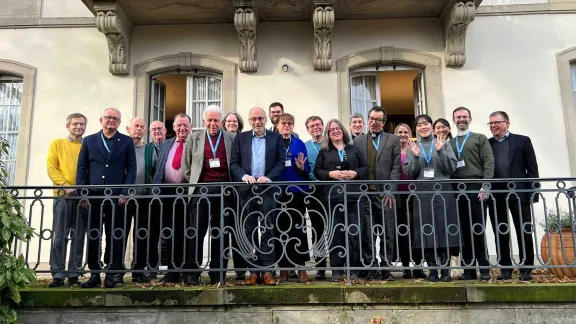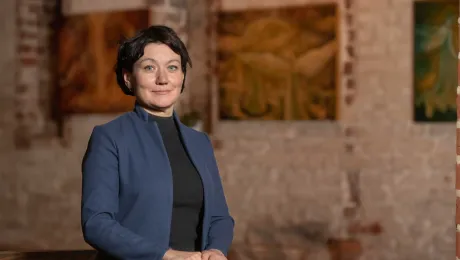
Participants at the JDDJ 25th anniversary conference at the Strasbourg Institute for Ecumenical Research. Photo: Anna Diebold
Anglican, Catholic, Lutheran, Methodist and Reformed churches mark 25th anniversary of historic agreement
(LWI) - Representatives of five global Christian communions gathered in Strasbourg from 30 January to 1 February to celebrate a milestone anniversary of the Joint Declaration on the Doctrine of Justification (JDDJ) and to explore ways in which it can help to deepen relationships between the churches.
The 25th anniversary meeting took place at the Institute for Ecumenical Research in Strasbourg, the same location where the JDDJ was composed by Catholic and Lutheran ecumenical experts in the 1990s. The landmark document was signed by leaders of the Lutheran World Federation (LWF) and the Roman Catholic Church in Augsburg on 31 October, Reformation Day, in 1999.
The anniversary conference was attended by several representatives of all the world communions who are now associated with the JDDJ – Methodist, Anglican and Reformed churches joining the original signatories. Participants included young theologians who were active in the discussions. The meeting consisted of lectures, joint study and small group discussions, as well as plenary reflections on the meaning of justification in contemporary contexts.
The JDDJ is not simply a doctrinal statement, it is a confession.
LWF Assistant General Secretary for Ecumenical Relations Prof. Dr Dirk Lange
LWF Assistant General Secretary for Ecumenical Relations Prof. Dr Dirk Lange, who attended the conference, stressed that “the JDDJ is not simply a doctrinal statement, it is a confession. It is an act, a commitment and a prayer. A confession always points to the Gospel and call us to unity in the Gospel. How can our confession be known in the world?”
Prof. Dr Theodore Dieter, a former director of the Strasbourg Institute and one of the original drafters of the JDDJ, spoke about its content and shared insights about debates around particular words used in the document. Participants heard about the process leading up to the signing ceremony, the surprising consequences on church politics and the way in which ecumenical progress (or lack of it) can often depend upon the commitment of individuals.
Discussions also focused on the important process of association, as the JDDJ developed from a historic bilateral agreement into a multilateral platform for ecumenical engagement, exploring key questions around the meaning of ‘communion of churches’. Methodist Bishop Emeritus Dr Walter Klaiber reflected on the biblical witness of justification which remains a central issue for all partners.
Translating into different cultures and languages
Catholic theologian Prof. Annemaria Mayer led participants in a discussion about ecclesial differences and the way these are expressed in the language of the different denominations. Can differences be treated in a relational way, she asked? What happens when differences are insurmountable? What are the practical and pastoral consequences of a differentiating consensus agreement such as the JDDJ?
Looking ahead, participants reflected on the relevance of justification today, as well as the challenges and riches that intercultural contexts offer for proclamation of the gospel. Discussion also focused on the question of translation, both literally and in the sense of translating into different cultural contexts.
“This is daunting but also exciting work, with great ecclesial potential as we grow deeper into communion,” Prof. Lange said. “As we share insights, we grow in our understanding and mutual trust. We discover what it means to be on this journey together, realizing that we cannot do without each other in our common search for the truth.”


